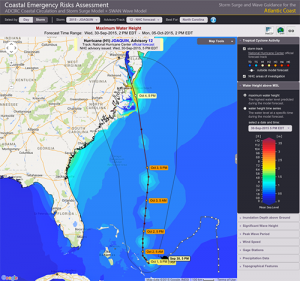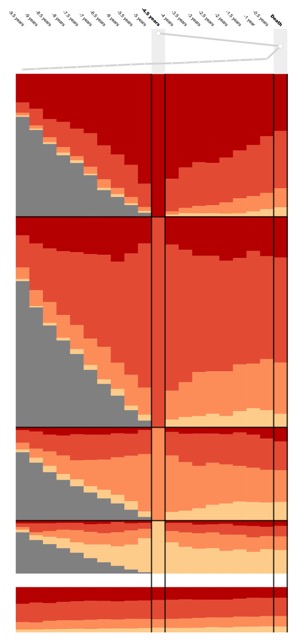Buried in troves of data that scientists have gathered, but not yet analyzed, could be key insights to improving health care disparities, coastal hazards, and urban planning in the southern United States.
(Chapel Hill, N.C. – Nov. 2, 2015) — The University of North Carolina’s Renaissance Computing Institute (RENCI) and Georgia Institute of Technology will co-direct a new, national effort that is unprecedented in scope to develop a big data innovation hub serving 16 southern states and the District of Columbia. The hub will have dual locations in Atlanta and Chapel Hill, with co-executive directors who will be accountable to hub partners.

Visualization of the ADCIRC Surge Guidance System (ASGS) output for Hurricane Joaquin (2015), advisory number 12, when the storm was considered a threat to the North Carolina coast. This ASGS model grid has very high resolution in the North Carolina area, and runs on RENCI high-performance computing systems. Other instances of the forecast system focus on different parts of the U.S and Gulf of Mexico coasts. The colors show water levels (in feet), with darker reds and oranges depicting higher water levels. The storm’s forecast track is also shown, along with the cone of track uncertainty. The simulation incorporated data on surface winds and atmospheric pressure derived from the National Hurricane Center’s consensus forecast track. The model output is posted to the North Carolina Coastal Emergency Risk Assessment website (nc-cera.renci.org) for dissemination to emergency responders. Research: Brian Blanton, RENCI; Rick Luettich, UNC Institute of Marine Sciences and UNC Coastal Resilience Center Computation: RENCI; Visualization: RENCI
The South Big Data Regional Innovation Hub (South BD Hub), which will use $1.25 million over three years in seed funding to establish a governance plan for long-term sustainability, is one of the National Science Foundation’s four Big Data Regional Innovation Hubs (BD Hubs) announced today. The new initiative aims to build innovative public-private partnerships that address regional challenges such as health care, habitat planning and coastal hazards through big data analysis. In addition to funding the launch of the Hubs, NSF announced a solicitation that is expected to provide $10 million to support research projects for Hub “spokes” nationwide.
“The explosion of data and increasing speeds with which it can be used will provide new career paths and the biggest opportunities of our age,” said UNC–Chapel Hill Chancellor Carol L. Folt. “The NSF Big Data Hub award puts Carolina and our region front and center in the effort to turn big data into knowledge that leads to better health care, more informed decisions, sustainable urban planning and many other practices.”
Each of the four NSF BD Hubs will engage businesses and research organizations in their region to develop common big data goals that would be impossible for individual members to achieve alone. In addition to community-driven governance structures, the hub will develop “spoke projects” based on regional priorities and partnerships.
Initial spokes of the South BD Hub will aim to apply big data analysis to scientific and social issues in five areas:
- Health Care, including disparities in health, access to health care, and health outcomes, precision medicine, and health analytics.
- Coastal Hazards, including understanding and mitigating the consequences of natural and manmade disasters.
- Industrial Big Data, including cyber-physical systems, the Internet of Things, data-driven management of physical infrastructure, and power generation, transmission, and distribution from a variety of sources.
- Materials and Manufacturing, including data-driven contributions to the materials genome initiative and bridging the gap between materials science and manufacturing practice.
- Habitat Planning, including urban infrastructure, smart cities efforts, transportation, rural-urban infrastructure, and wildlife habitat and conservation.
“The chance to lead this project with Georgia Tech means we will be at the forefront of using data for the public good,” said Ashok Krishnamurthy, deputy director at RENCI and co-principal investigator on the South BD Hub project. “The important problems of our time—from solving disparities in health care to understanding the risks of coastal storms and floods—involve making sense of massive amounts of data.”

The Centers for Disease Control and Prevention estimate more than 29 million Americans—about 1 in 11—live with diabetes. Controlling the disease and its possible debilitating complications requires patients to carefully monitor their blood sugar levels. However, experts are not yet sure how much the normal threshold for blood sugar level varies over time, and some studies suggest patients could suffer if treatment regimens are more intense than needed. To help understand normal daily and long term fluctuations in blood sugar levels, researchers at Duke University analyzed 10 years of HbA1c levels in a sample of patients using different diabetes management treatments and visualized their results with support from UNC-Chapel Hill’s Renaissance Computing Institute (RENCI). In this image, the horizontal axis represents 10 years, ending at the right with the death. HbA1c values are categorized from normal (yellow) to uncontrolled (red). Doctors and researchers can select any combination of six-month periods to see the proportion of patients in each category at that time and how those proportions change over time. This type of visual analytics helps in understanding the progression of diabetes in different subpopulations and should enable patient-specific treatments in the future. Researchers: W. Ed Hammond, Eugenia McPeek Hinz, Vivian West, and Igor Akushevich, Duke University Center for Health Informatics; Leigh Ann Herhold, North Carolina State University; Visualization: David Borland, RENCI
The South BD Hub team will put to use lessons learned in developing the National Consortium for Data Science, a public-private partnership to address big data issues launched by RENCI in 2013, as Georgia Tech and RENCI develop the hub’s governance structure and programs. In addition, RENCI will leverage its expertise in technology and software development to manage big data sharing within the South BD Hub and collaboration with other regional hubs.
The SouthBD Hub will serve 21 partner institutions in the states of Alabama, Arkansas, Delaware, the District of Columbia, Florida, Georgia, Kentucky, Louisiana, Maryland, Mississippi, North Carolina, Oklahoma, South Carolina, Tennessee, Texas, Virginia and West Virginia.
“Data science touches all aspects of the human experience and the hub will enable us to bring data together in a complementary way for better problem solving in our communities,” said Srinivas Aluru, co-principal investigator with Krishnamurthy on the project and a professor in Georgia Tech’s School of Computational Science and Engineering. “It already is initiating new collaboration and dialogue among many large stakeholders in a way that would not have happened otherwise.”
In addition to the South BD Hub, the NSF has funded Hubs in the Northeast, Midwest, and Western U.S., which are managed by universities in those regions.
UNC-Chapel Hill/RENCI contact: Karen Green (919) 445-9648, kgreen@renci.org
UNC Communications and Public Affairs contact: Thania Benios, (919) 962-8596, thania_benios@unc.edu
Georgia Tech contact: Tara La Bouff, (404)769-5408, tlabouff@cc.gatech.edu


